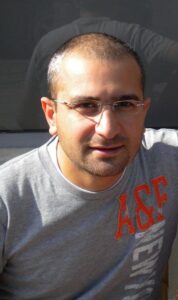Until the "Day against Homophobia" on 17 May, we will be presenting people, projects and campaigns that are committed to fighting homophobia here on the blog. We talk to them and listen to their stories. They are diverse, colourful and exciting and show the many different faces this commitment can take.
Part 4: The community is not as homogeneous as Germans often believe
Ulaş Yılmaz on homophobia in Muslim communities and what he actually encounters more often: Homophobia or xenophobia?

Computer scientist Ulaş Yılmaz (34) is a political person. Even as a student in Ankara, he was involved in Kaos GL, an action group for LGBT rights. He also met his German-Turkish partner there, with whom he now lives in Berlin. He is also active in Germany: he has campaigned for the "Gays and Lesbians from Turkey" (GLADT) and took part in the PaKoMi project of Deutsche AIDS-Hilfe (participation and cooperation in HIV prevention with migrants). Ulaş is currently involved in a project organised by the Berlin AIDS service organisation, where he is discussing with around 20 people from various migrant communities how HIV prevention could be promoted in these communities. Philip Eicker asked Ulaş about his experiences with homophobia.
Ulaş, when was the last time you experienced homophobia?
Hm, that was a really long time ago. I can only give you one example. It was here in Berlin at Potsdamer Platz. We were kissing on the grass. Someone walked past about 40 metres away and called us "faggots". But the people around us were relaxed and in the end he was the stupid one. So it wasn't threatening at all. But you don't always notice homophobia because it's hidden. I often have to state in documents that I'm in a civil partnership. Maybe I've already been discriminated against because of that, but I don't know anything about it.
What do you encounter more often: homophobia or xenophobia?
I encounter racist behaviour almost every day. An everyday case is the doctor or the civil servant who speaks to me loudly and clearly as if I'm obtuse. The last difficult case was a friend of mine. He was shouting at other people on the underground: "Go to where you came from!" I was there and he knows that I'm from Turkey. But he didn't care. I went home and couldn't think properly. I'd love to forget something like that straight away, but I can't. I'm paralysed. It takes months before I can cry about it.
What was so hurtful about this statement?
It's about my existence. The statement is: "You're not allowed to be here." But I am here. If someone from the majority society attacks me in a racist way, it's not a fight between equals. I know how helpless I am as a migrant. Our share of power is very small. Just one example: the proportion of journalists with a migration background is so small that I had to experience the discussion about Sarrazin in the media as a discussion among white people. And they are by no means mine Voice.
Many gays fear that homophobia is stronger in Muslim communities.
I must first clarify the question of what "the Muslim community" actually is. As far as Turks are concerned, there are big differences between the communities in Berlin, Cologne and Munich. That's why I don't want to talk about Germany, but only about Berlin. Because I know this community. There are Muslims and atheists, social democrats and conservatives, gays, lesbians and heterosexuals ... The community is not as homogeneous as Germans often believe. You have to take these differences into account before you ask a question like this. The bad thing about it is that when you ask the question, you have already established that the German majority society is completely different. That then resonates: We don't have anything like that!
You mean there is hardly any homophobia in the Turkish community?
Homophobia is everywhere, that's the reality. But the fight against homophobia is also everywhere - including in the Turkish and so-called Muslim community. If you want to do something about it, you can find allies to do something about it together. You just have to make the effort to find and speak to these people.
Do you have any ideas on how to combat homophobia?









